Election delay case: Ruling coalition has no trust in three-member bench
6 min readThe ruling coalition does not trust the three-member bench, currently hearing the PTI’s petition against the decision of the ECP to postpone the Punjab elections from April 30 to October 8.
“[We] have no confidence in the three-member bench,” said a statement issued on Saturday.
The Pakistan Democratic Movement—the ruling coalition which came into power almost a year ago after ousting Imran Khan from the PM Office—made the decision during its meeting conducted by Prime Minister Shehbaz Sharif.
Former president Asif Ali Zardari, Pakistan Democratic Movement chief Maulana Fazlur Rehman, Bilawal Bhutto Zardari, Maryam Nawaz Sharif, and leaders of other parties attended the meeting through video link.
The announcement comes as Pakistan deals with the judicial crisis that started after the SC bench formed to hear the PTI’s plea further diminished with dissenting notes from the judges—around a year ago the country was dealing with a similar crisis when the deputy speaker threw out the no-trust resolution against the-then prime minister Imran Khan. Many experts had described that the Constitution was at risk.
April 2022 crisis was resolved after the Supreme Court took suo motu–a power entitled to the chief justice of Pakistan–and set aside the ruling and dissolution of the National Assembly. The rest is history: Imran Khan lost the trust vote, Shehbaz Sharif preceded him, and the PDM came to power.
But since his ouster, Imran pressed the government to hold fresh polls through protests and rallies. With the same demand, the assemblies of Punjab and Khyber Pakhtunkhwa, ran by his parties, were dissolved earlier this year by chief ministers of the provinces respectively.
The apparent delay in the announcement of elections to the two assemblies prompted the party to approach the Supreme Court, however, the apex court had taken the suo motu on it. Matters got tense amid the audio leaks apparently involving a sitting judge and when some judges left the benches and some wrote dissenting notes.
‘No confidence in three-member bench’
The coalition government has demanded that elections across the country should be held on the same day as it was a “basic constitutional prerequisite for impartial, transparent and free polls” and any deviation from it would create a “disastrous political crisis” for the country.
The leaders considered in detail the overall political situation in the country and held consultations on future strategy, said the statement available with the Associated Press of Pakistan.
They said any deviation would be similar to a “suicide attack” on the economic interests of the country. The apparent conspiracy to create an unending political and constitutional crisis under the pressure of a party which was attacking the state institutions with its gangs, would not be acceptable in any way, it added.
They were of the view that “unfortunately an administrative issue was turned into a political and constitutional crisis” and ignoring economic, security, constitutional, legal and political affairs would be akin to neglecting the interests of the state.
The haste to achieve a particular objective for giving relief to a party looked like a political agenda and it was against the Constitution, it alleged.
According to Article 218(3) and other articles of the Constitution, holding the election was the prerogative of the ECP and according to the Constitution, the “Supreme Court should not interfere in the authority of an independent and autonomous Election Commission”. They said the four honourable judges of the SC gave the same verdict in the suo motu case number 1/2023.
“No confidence in the three-member bench of the Supreme Court headed by the CJP and comprising Justice Ijazul Hasan and Justice Muneeb Akhtar and demanded that the majority decision of the four members in the suo motu case 1/2023 should be accepted and the current judicial proceedings should be stopped,” it said.
“It is unfortunate that the Chief Justice of the Supreme Court wanted to impose the decision of the minority on the decision of the majority,” they said.
They claimed that such behaviour was not only a clear example of a grave constitutional and political crisis in the country but was also evident of “deviation from the Constitution” and laid down legal procedure, which was a “flagrant violation of the basic concept of separation of powers of the state”.
The huddle raised the issue that a bench headed by a senior most judge of the SC Justice Qazi Faez Isa ordered the suspension of hearing of all cases under Article 184(3) of the constitution, adding that contradictory court decisions had created an “unimplementable and complex situation” and respect of the decision of the bench of Justice Isa was also “mandatory” for everyone.
They demanded that action should be initiated on the references filed by the Pakistan Bar Council and other associations under Article 209 of the Constitution. They clarified that Justice Ijaz ul Hasan had already voluntarily recused himself from the bench in this particular case, so he could not be part of the present bench.
In this respect, the orders of Justice Mansoor Ali Shah and Justice Jamal Khan Mandokhail were clear and it all was present on the record.
Participants of the meeting urged the CJP to listen to the dissenting voices rising from the benches of the SC as chief of the institution and immediately form a full court to negate the impression of “one man show”.
They declared that the “verdict of the three members on the issue of Article 63A was the cause of political instability and through it the constitution was re-written”. They added that clear division could be seen in the thinking of the SC, therefore the apex court should refrain from issuing controversial political decisions.
It was urged that the impression regarding the CJP and some other judges that they were adopting a “special discriminatory attitude” in the matter of PTI, should be removed. They also highlighted “that those who are advising politicians to take decisions by sitting together are also divided and they should create unity and unanimity among themselves”.
Government considering ‘filing’ reference against three judges
Interior Minister Rana Sanaullah has said that the government was considering a decision to file a reference against CJP Bandial and other two judges.
“This is under discussion. But so far no decision has been made on this. But this decision can be made as these three honourable judges have a long record of giving such decisions that have been against the PML-N,” he told the Independent Urdu in an interview aired on April 1.
He claimed that one of such decisions “amounts to rewrite the Constitution”–a demand according to him held by not just the PML-N but many legal experts.
“The decision which is related to Article 63A under which the PML-N government was ended in Punjab,” he said and alleged that the three-judge bench was adamant to give the decision on their own.
“No other option is left after this to note our protest,” he said.
For the latest news, follow us on Twitter @Aaj_Urdu. We are also on Facebook, Instagram and YouTube.






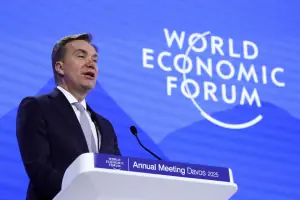








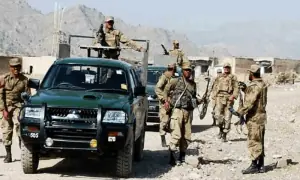

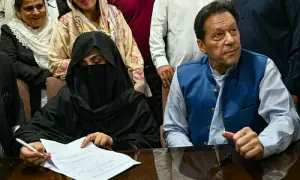



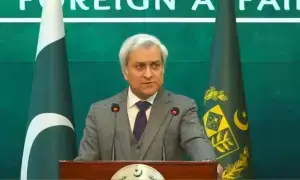
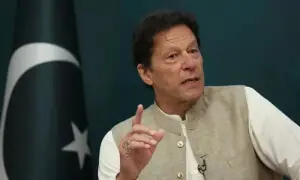
Comments are closed on this story.